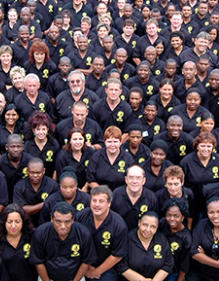|
Getting your Trinity Audio player ready...
|
 Dear Corruption Watch,
Dear Corruption Watch,
South Africa has three institutions with powers to investigate corruption in government: the Hawks, the Special Investigating Unit (SIU) and the public protector. Who does what, and from where do they derive their powers? What does it mean that they are independent?
Curious
Dear Curious
The National Prosecuting Authority (NPA), its asset forfeiture unit, the Financial Intelligence Centre (FIC), auditor-general, Public Service Commission and Independent Police Investigative Directorate are also institutions whose job it is to combat corruption.
Most of these institutions work in partnerships to investigate and prosecute graft. The anti-corruption task team consists of the Directorate for Priority Crime Investigation (Hawks), the SIU and the NPA.
The task team is supported by the South African Revenue Service, FIC and the attorney-general. There is also a multi-agency working group on procurement.
It consists of the auditor-general, SARS, the FIC and the SIU. It is supported by the Hawks and the NPA.
These are a lot of acronyms and initialisms to remember, but essentially the Hawks, the SIU and the NPA investigate and prosecute corruption in general.
The auditor-general, SARS and the FIC investigate irregularities in government procurement.
The public protector investigates mainly improper conduct, maladministration and the abuse of power in state affairs, and seeks to redress improper administration in the public service.
These organisations derive their powers from specific legislation, including the constitution.
The Hawks, SIU and public protector are independent institutions in that they are meant to be shielded from political interference.
Such independence is vital to combat corruption without fear or favour.
The often expressed concern in terms of the Hawks and the SIU is that they are beholden to the executive and thus their independence is undermined.
For example, the SIU requires a presidential proclamation for it to conduct an official investigation.
The independence of the Hawks, too, has been challenged in court. Businessman Hugh Glenister brought the initial challenge regarding the constitutionality of various sections of the South African Police Service Act because of their failure to secure the independence of the unit charged with investigating and combating corruption.
The Constitutional Court found in Glenister’s favour and declared a part of the act to be inconsistent with the constitution and invalid. It did not provide an adequate degree of structural and operational autonomy for the Hawks.
The act was then amended, but in December the Western Cape High Court found that the amendment still did not provide an adequate degree of insulation from political influence. This court application was brought by the Helen Suzman Foundation.
It maintained, as Corruption Watch did and still does, that independent policing and prosecuting bodies that are sufficiently protected from interference were indispensable in the fight against corruption.
The court found in particular that the appointment process for the head of the Hawks vested an unacceptable degree of political control in the minister and the cabinet and that it was in conflict with international best practice.
The judgment is a great victory for corruption fighters.
Parliament, after referring the court order to the Constitutional Court for confirmation, must remedy the legislative defect within 12 months.
At that time, we hope to see a statute that allows us to view one of our key corruption-fighting institutions as truly independent.
• This article was first published in Sunday Times: Business Times




